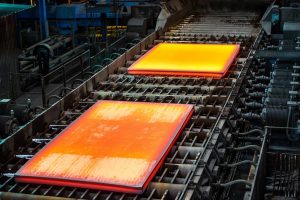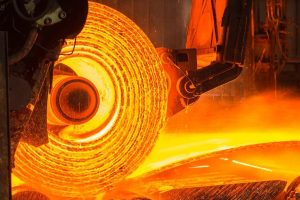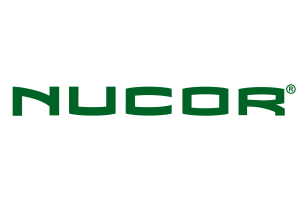
SMU Survey: Buyers' sentiment remains upbeat
SMU's Steel Buyers’ Sentiment Indices continue to show that steel buyers are optimistic for their businesses’ chances of success.

SMU's Steel Buyers’ Sentiment Indices continue to show that steel buyers are optimistic for their businesses’ chances of success.

Since late 2025, mills have begun to hold a firmer stance on prices, tightening their grip at the start of this year and holding on since

Once wintery weather gives way to sunnier spring conditions, plate sources foresee the market accepting the $50-60 per short ton spot price increases issued by Nucor Plate Group, Oregon Steel Mills, and SSAB.

I’m going to play devil’s advocate for a narrative that has become the consensus for much of the US steel market. You know how it goes. Domestic steel prices will continue to go up despite uneven demand thanks to low supplies stemming in large part from tariffs and limited import competition. That's been the case for months now. Will it continue to be?

One third of the steel buyers responding to our market survey this week reported that domestic mills are negotiable on new spot order pricing. Mills began to hold a firmer stance on prices towards the end of last year, tightening their grip in early January and holding it since.

Participants in the hot- and cold-rolled coil markets said winter storms in the East and Midwest may disrupt weekly order volumes and prices.

Rising global capital and power costs, driven by China's production cap and higher-cost expansion in Indonesia, are resetting aluminum's incentive price, making higher LME levels necessary to unlock new primary capacity outside China.

Just over a third of the steel buyers who responded to our market survey this week reported that domestic mills are willing to talk price to secure new spot orders.

We will examine the wisdom of hedging from the perspective of both the LME and Midwest premium, and whether you are approaching the market as a buyer or a seller.

Nucor increased its weekly hot-rolled coil spot list price by $10 per short ton (st) again on Monday, Dec. 15. This was its eighth increase in as many weeks, moving up $65/st over that span.

US plate market participants hope the new year will bring favorable market conditions. But they remain leery of making big purchases because of lingering uncertainty.

Less than half of the steel buyers who responded to our market survey this week reported that domestic mills are willing to talk price on new spot orders

Nucor increased its weekly hot-rolled coil spot list price by $10 per short ton (st) on Monday, Dec. 8.

The price hike parade that got underway in earnest in November looks set to continue in December. And it's been joined by, well, just about everybody.

You might be looking forward to some Black Friday deals. But I wouldn't expect many, at least when it comes to flat-rolled steel.

All five of SMU’s sheet and plate price indices increased this week for the second week in a row, with all products inching up to new multi-month highs. Prices are now up by $30-70/st compared to those seen four weeks ago.

Nucor plans to increase prices for steel plate by $30 per short ton (st). The move coincides with Charlotte, N.C.-based steelmaker opening its plate orderbook for January.

SMU’s price indices increased across the board this week, reaching new multi-month highs.

Just over half of the steel buyers who responded to our market survey this week reported that domestic mills are willing to talk price on new spot orders. Mills have begun to hold a firmer stance on prices over our last two surveys.

SMU's sheet and plate steel prices moved higher in unison this week.

Nucor increased its weekly hot-rolled coil spot list price by $5 per short ton on Monday, Nov. 10.

Earlier this week, SMU polled steel buyers on an array of topics, ranging from market prices, demand, and inventories to tariffs, imports, and evolving market events.

What's on steel buyers' minds this week? We asked about market prices, demand, inventories, tariffs, imports, and other evolving market trends. Read on for buyers' comments in their own words...
After marginally rising in August and September, the premium galvanized coil carries over hot-rolled coil (HRC) coil has narrowed again in recent weeks. As of Sept. 16, the spread between these two products has shrunk to a two-and-a-half-year low of $125 per short ton (st).
Some sources also speculated that plate could see further price increases thanks to modest but steady demand, lower imports, mill maintenance outages, and end markets less immediately affected by tariff-related disruptions.

Earlier this week, SMU polled steel buyers on an array of topics, ranging from market prices, demand, and inventories to tariffs, imports, and evolving market events.

SMU’s sheet and plate prices see-sawed this week as hot-rolled (HR) coil prices held their ground while prices for galvanized product slipped.

Each of our Sentiment Indices continues to reflect that steel buyers are positive about their present and future business prospects, though that confidence has eased considerably compared to the beginning of the year.

Steel buyers say mills remain slightly more willing to negotiate spot prices for sheet and plate products than in mid-September, according to our latest market survey.
Domestic plate market participants are optimistic about the market despite the ongoing uncertainty that’s characterized most of 2025, sources said.